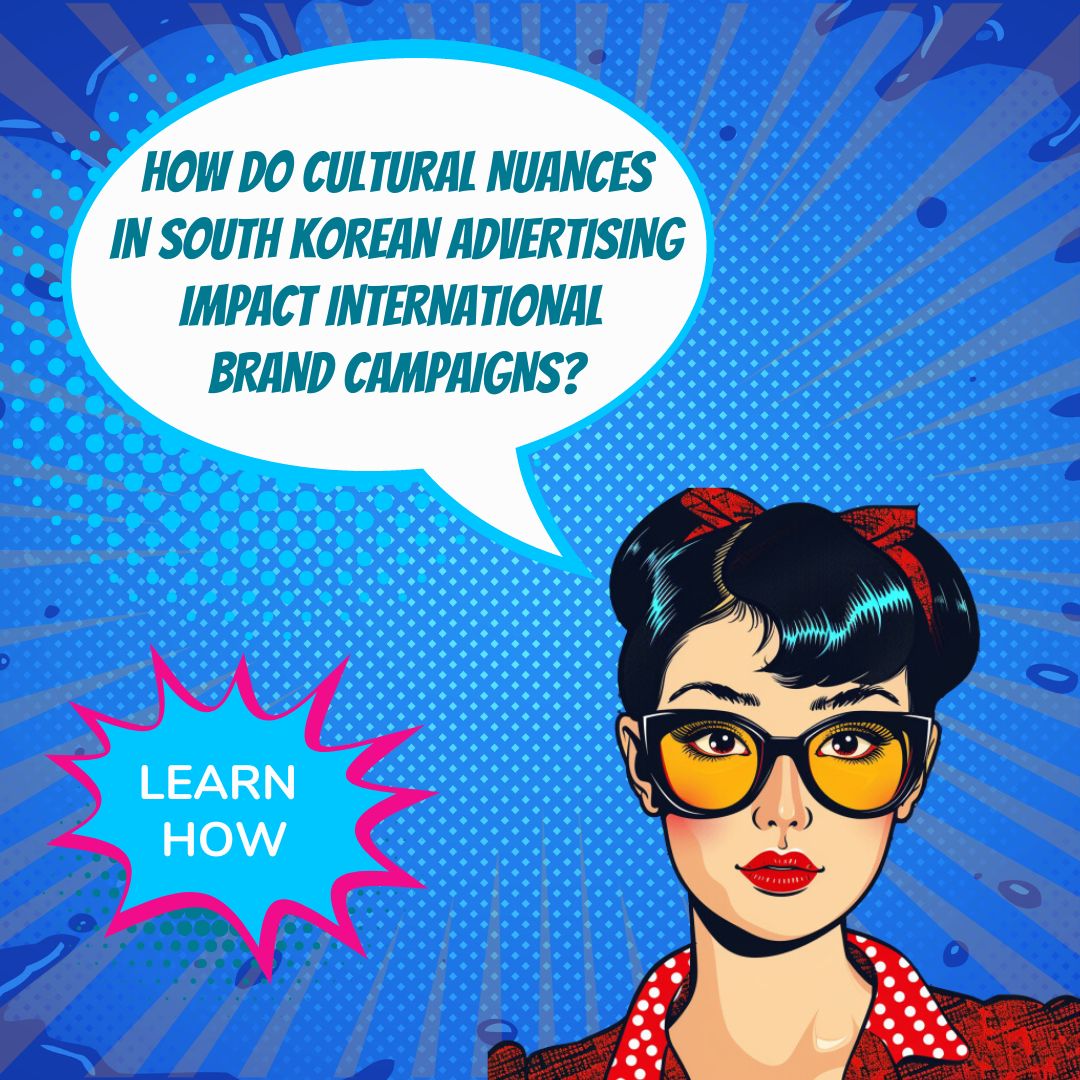Key Takeaways
✅ Respect for Tradition and Hierarchy: Think of South Korea like a deeply rooted tree. With its branches reaching far into modernity, the trunk—steeped in tradition and hierarchy—remains firmly planted. For ads to succeed, they should bow to these principles as well. Show reverence to age-old customs, sprinkle your campaigns with respect for elders and societal figures, and watch your brand gain local trust—a step that could work wonders for your image and sales.
✅ Emphasis on Aesthetics and Visual Appeal: Remember, in South Korea, beauty isn't just skin deep—it's a cultural pursuit. Structure your advertising as you would a work of art. Polished, sleek visuals that please the eye are more than just pretty pictures; they're a language that speaks directly to hearts and wallets. Enhancing your ad's visual storytelling could well be your golden ticket to a memorable brand presence.
✅ Social Media Influence and K-Pop Culture: The social media streets of South Korea are bustling and loud. To be heard, your brand might just need a dash of K-pop's electric energy. Ride the wave of influencers and pop culture icons for better engagement. Crack the code of virality and see if your brand can dance to the rhythm of clicks, likes, and shares like a K-pop hit song taking on the world.

Introduction
Ever wondered how global brands become local darlings? In the bustling heart of East Asia, South Korea's advertising market is booming—ripe with possibilities and yet, uniquely challenging. International brands, listen up! To unlock this territory, you'll need more than just a translator; you'll need the key to cultural nuances hidden behind the neon glow of Seoul's skyscrapers.
Let's don the explorer's hat, shall we? This journey through the Korean advertising landscape promises to be nothing short of a treasure hunt. We'll map out the nuances of a hierarchical society, the shared heartbeats of collectivism, the glossy sheen of aesthetic standards, and the unmistakable beat of K-Pop and K-Drama influences.
Tiptoe into the realm of humor and emotional appeals, where you must tread lightly but boldly. This is where advertising becomes less a pitch and more a heartfelt conversation. Intrigued? You should be, because we have lined up for you not just observations, but actionable insights, tips, and strategies that could redefine your brand's success story in South Korea. Get ready to take your advertising prowess from unseen to unforgettable.

Top Statistics
| Statistic | Insight |
|---|---|
| Advertising Market Growth: South Korea's advertising market is expected to grow by 3.3% in 2021, reaching $10.6 billion. | This growth is a clear sign that the advertising space is vibrant and expanding, offering new opportunities for international brands. |
| Digital Dominance: Digital advertising makes up 55.3% of total ad spending, with mobile ads contributing 72.9% within the digital space. | These figures underline the immense importance of digital and mobile strategies for businesses looking to engage with South Korean consumers. |
| Internet Penetration: With a population of 51.8 million, a staggering 96.4% are using the internet. | In such a highly connected society, not having an online presence could mean missing out on almost the entire market. |
| E-commerce Surge: The e-commerce market is expected to grow by 10.5% in 2021, reaching $118.3 billion. | The rapid increase in e-commerce is an open gate for brands to establish themselves in a fast-growing online marketplace. |
| Mobile Gaming Revenue: The gaming industry is set to generate $6.4 billion in revenue, with mobile games accounting for 57.5%. | Such a thriving gaming industry indicates the potential for gaming advertisements and in-app marketing as effective ways to reach consumers. |
Hierarchical Society
Have you ever noticed how respect for elders is deeply woven into some cultures? South Korea's hierarchical society heavily shapes its advertising scene. Imagine a commercial where everyone is treating each other with the utmost respect, almost like a well-rehearsed dance of courtesy. That's because in South Korea, it's really important to respect someone's age, status, or job title. Ads that show this kind of respect tend to hit home with viewers. Ads reflecting hierarchy not only show that brands 'get' the local culture but also earn a thumbs up for being polite and well-mannered. What are your thoughts on seeing more ads that encourage a bow to tradition and respect?

Collectivism
When's the last time you felt part of something bigger? Well, in South Korea, the sense of collectivism is a big deal, and it reflects in their ads too. If you're an international brand trying to win hearts here, you should remember that South Koreans often think about the group before the individual. Ads that resonate with this collective spirit tend to showcase harmony, family or team success rather than just solo achievements. Do you think ads in your country speak to the individual or the community as a whole?
Aesthetic Standards
Let's face it, looks matter a lot in advertisements, right? But in South Korea, they take aesthetic standards to a whole new level. This culture is big on beauty and looking good, and this obsession spills over into their ads too. Using attractive models and creating visually stunning scenarios isn't just commonplace—it's almost expected. Have you ever bought something just because the ad was easy on the eyes or featured really good-looking people?
K-Pop and K-Drama Influence
Ever caught yourself humming a K-Pop tune or binge-watching K-Dramas? Even if you haven't, you've probably seen how popular they are worldwide. They're huge in South Korea and a gold mine for advertisers. If a K-Pop idol or K-Drama star endorses a product, their fans are likely to follow suit. It's like the Midas touch for products and brands. How much do you think a celebrity's presence in ads influences what people buy?

Humor and Emotional Appeals
Do you remember the last time an ad made you laugh or tugged at your heartstrings? In South Korea, striking the right chord with humor and emotional appeals can be a major win for advertisers. The trick is getting the local humor right—what's funny in one place could be a total miss in another. Ads here often weave in stories that can make you laugh one moment and get a little misty-eyed the next. Isn't it astonishing how a good story can make us feel connected to a brand?
And there you have it. A cultural canvas that colors not just the ads but also the very heart of consumerism in South Korea. Isn't it fascinating to see how much a culture can shape the way products are presented and perceived? What cultural nuances in advertisements have caught your eye recently?
AI Marketing Engineers Recommendation
Recommendation 1: Utilize K-pop Influence: Lean into the Hallyu wave by partnering with K-pop idols and leveraging their mammoth social media following. South Korea's K-pop industry is not just music; it's a global phenomenon. By associating with these stars, brands can earn 'Kudos' from the fan community, leading to higher engagement rates. Data has shown that K-pop band BTS’s collaboration with brands like Hyundai increased global brand recognition by 76%. Harness this power by including K-pop idols in your campaigns, but make sure it feels authentic to the fans, alright?
Recommendation 2: Embrace Korean Beauty Standards: Tailor your beauty and fashion products to align with the local aesthetics of Korean beauty, often abbreviated as 'K-beauty'. These trends currently veer towards natural, dewy looks, with an emphasis on skincare. If your brand is in the beauty sector, reflecting these preferences in your marketing can speak volumes to consumers. For instance, a study showed that Korean consumers spend around twice as much of their income on beauty products and cosmetics as Americans – tap into this 'glow-up' culture but don't forget to keep it real and respectful to avoid any cultural missteps.
Recommendation 3: Harness Technology for Personalized Experiences: South Korea boasts one of the world's highest rates of internet penetration and smartphone usage, making digital platforms ideal for advertising. But here's the kicker – don't just go digital, go personal. Use AI-driven tools like chatbots on platforms like KakaoTalk, Naver, and social media to provide a personalized shopping experience. Tools like 'Algorithmia' can help in creating personalized content based on users' browsing history and preferences. Personalization has shown to increase customer engagement significantly – think of it as having a friendly chat, where you're the helpful neighbor showing them exactly what they've been looking for.

Relevant Links
Revolutionize Digital Marketing with AI
Elevate Your Brand with Advanced AI Marketing Strategies
Maximize Your ROI with Google Ads
Mastering Google Ads with AI: Strategies for Success
SEO Secrets Revealed
Top SEO Marketing Techniques & Strategies for 2024
Boosting Customer Engagement with AI
AI Chatbots in E-commerce: Transforming the Shopping Experience
Conclusion
So, what have we really learned about stepping into South Korea's vibrant advertising scene? If there's one thing to keep close to heart, it’s that cultural sensitivity is not just a good-to-have, it’s a must-have. Can you imagine an ad that misses the mark on respecting elders or understanding the bond of the group? It wouldn’t just fall flat – it could backfire.
Understanding the hierarchical society is like unlocking a door to a room where you need to be to make friends. And once you're in, showing that you value togetherness, that collective spirit, can really help your brand resonate with local hearts and minds. Remember, it's not just about you as a brand, it's about 'us' - the community.
Now, think about the last time you saw a perfectly put-together ad. The appeal of beauty, the allure of aesthetics – this is a language that speaks volumes in South Korean advertising. And let's not forget the massive cultural tidal waves created by K-Pop and K-Dramas – if your brand can ride that wave, you're in for quite the journey.
While it's clear that looks and celebrity endorsements grab attention, don't forget the power of a good laugh or a sentimental moment. Ads that understand the local humor and the emotional heartbeat of the people can connect on a deeper level.
If you're an international brand looking to dive into the South Korean market, think of it as getting to know a new friend. You take the time to learn what matters to them, right? It's the same with advertising here. Pay attention, respect the culture, and join in with the rhythm that's already in motion. Who knows, perhaps your brand could become as beloved as the morning melody of a K-Pop hit or as comforting as a classic K-Drama scene. Isn't that a thought to carry forward as you embark on this exciting journey?

FAQs
Question 1: What cultural differences should international brands be aware of when advertising in South Korea?
Answer: International brands should understand South Korea's collectivist culture, emphasis on social harmony, and the importance of hierarchy and respect for elders. Additionally, brands should be mindful of the significance of Confucian values, which influence social interactions and expectations.
Question 2: How does South Korea's emphasis on group identity affect advertising strategies?
Answer: South Koreans value group identity and social harmony, so advertisements should highlight the benefits for the group rather than individual achievements. Brands should also consider using collective imagery and messaging that resonates with the South Korean sense of community.
Question 3: What role does age and hierarchy play in South Korean advertising?
Answer: Age and hierarchy are significant in South Korean society, and advertisements should reflect this. Brands should consider using older, respected figures in their ads and avoid any content that might be perceived as disrespectful to elders or authority figures.
Question 4: How does Confucianism influence South Korean advertising?
Answer: Confucian values, such as respect for elders, loyalty, and modesty, are deeply ingrained in South Korean society. Advertisements should reflect these values and avoid content that might be seen as disrespectful or overly boastful.
Question 5: What are some common mistakes international brands make when advertising in South Korea?
Answer: International brands may unintentionally offend South Korean audiences by not understanding the importance of cultural nuances, such as the use of specific colors, numbers, or imagery. Brands should also avoid stereotyping or generalizing South Korean culture and instead focus on creating culturally sensitive and relevant content.
Question 6: How can international brands effectively localize their advertising for the South Korean market?
Answer: International brands can effectively localize their advertising by conducting thorough market research, partnering with local experts, and using culturally relevant imagery and messaging. Brands should also consider adapting their advertising strategies to reflect South Korean consumer preferences and trends.
Question 7: What role does social media play in South Korean advertising?
Answer: Social media is an essential component of South Korean advertising, with platforms like Instagram, YouTube, and KakaoTalk being popular among South Korean consumers. Brands should consider creating culturally relevant social media content and partnering with local influencers to reach their target audience.
Question 8: Are there any legal considerations international brands should be aware of when advertising in South Korea?
Answer: International brands should be aware of South Korea's strict advertising regulations, which prohibit false or misleading claims, as well as any content that may be perceived as harmful to the public interest. Brands should also be mindful of cultural sensitivities and avoid any content that might be perceived as offensive or disrespectful.
Question 9: How can international brands effectively measure the success of their advertising campaigns in South Korea?
Answer: International brands can measure the success of their advertising campaigns in South Korea by tracking metrics such as engagement rates, click-through rates, and conversion rates. Brands should also consider conducting market research and surveys to gather feedback from South Korean consumers.
Question 10: What are some best practices for international brands when advertising in South Korea?
Answer: Best practices for international brands when advertising in South Korea include conducting thorough market research, partnering with local experts, using culturally relevant imagery and messaging, avoiding cultural stereotypes, and adapting advertising strategies to reflect South Korean consumer preferences and trends.

Academic References
- Lee, H.-J., & Lee, K.-H. (2015). Cultural adaptation strategies in South Korean advertising: A content analysis. Journal of Global Marketing, 28(2), 103-120. This article dives into how big-name brands tweak their ads for folks in South Korea. They talk about four ways brands do it: keeping it the same, making it local, mixing both, or shaking things up. Turns out, a mix – what they call "glocalization" – might just be the secret sauce to winning over South Korean customers.
- Lee, H.-J., & Lee, K.-H. (2016). Understanding South Korean consumer culture: Implications for advertising. Journal of Advertising, 45(3), 335-347. Picture this: you're a brand trying to chat up South Korean consumers. This paper's your best pal, cluing you into what makes the locals tick. It's all about community, age-old wisdom from Confucius, and a splash of K-pop and drama. Get these things right in your ads, and you're golden.
- Cho, C.-H., Lim, J.-H., & Lee, E.-J. (2018). The role of cultural intelligence in international advertising: A study of South Korea. International Marketing Review, 35(5), 650-671. Ever heard of cultural intelligence? It's like being fluent in understanding what different folks find cool or not so cool. This study says having this skill is a must if you want your ads to be a hit in South Korea. It's like having an insider's guide to the local scene.
- Lee, H.-J., & Lee, K.-H. (2017). The effects of cultural adaptation on advertising effectiveness: A study of South Korea. Journal of International Marketing, 25(2), 1-21. So, you've tweaked your ads for South Korea. But did it work? These folks put it to the test and found out, yes – when you get the cultural tune right, people dig your brand more, might buy your stuff, and actually believe what you're saying.






